Standard: Difference between revisions
No edit summary |
(Overhauled) |
||
| Line 1: | Line 1: | ||
'''Standard''' | '''Standard''', in contemporary use, is a format with all cards from [[Return of the King]] to [[Age's End]] (sets 7-19) as well as [[The Weta Collection]], excluding cards on the [[X-list]] and [[King Block]] sites. It is the last incarnation of Decipher's "standard" format for competitive play. On [[mLOTRO]], this format is called "Hunters Standard". | ||
In the first three sets, playing the game simply meant using the cards that had been printed. [[The Two Towers]] introduced a new site path and split the game into formats -- "block" formats which had completely separate card pools and a single "open" format which allowed all cards except sites from past blocks. Not long after, Decipher determined that a small group of cards had an outsized impact on the competitive landscape and created the "standard" tournament format -- [[Open]] with an [[X-list]]. While block formats mostly stayed the same, Standard grew with each set and included all cards (except for the obsolete sites and the X-list) up until the 12th set. When [[Black Rider]] was released in 2005, Decipher began [[Rotation|rotating out]] older sets in Standard similar to other TCGs like ''Magic: the Gathering''. This was not popular with players who preferred to use those cards, and was announced during a time of many other unpopular changes. To compensate, Decipher created one last format: [[Expanded]]. | |||
Past blocks (including [[Movie Block]]) and Expanded were supported in official tournaments, but Standard was always preferred by Decipher. A majority of tournaments they hosted as well as the Worlds Championship tournament were always held in Standard. For some, structured play was the only reason to build a deck in the format at all. Once Decipher's license over the game expired there was nothing to prop Standard up, leaving it largely ignored by the community both offline and in online recreations like [[GEMP]] or [[mLOTRO]]. | |||
Today, | Today, though Standard itself is not very popular, several of the most played formats are "snapshots" of older versions of Standard. They include all cards released up to some cutoff point (usually the end of a [[Block]]), with the exception of obsolete sites and X-listed cards. Because these formats are primarily to play the game as it used to be, the communities which implement them often exclude rule changes that were made later in the game's life span. They stand in contrast to Block formats, which only include cards from a block of about three sets released (more or less) one after another. The most notable of these historical formats are '''[[Fellowship Block]]''', '''[[Towers Standard]]''', and '''[[Movie Block]]'''. | ||
== X-List == | == X-List == | ||
''For the X-list in historical versions of [[Standard]], see [[X-list]] or the articles for those formats.'' | ''For the X-list in historical versions of [[Standard]], see [[X-list]] or the articles for those formats.'' | ||
The last [[Current Rulings Document]] | The last [[Current Rulings Document]] forbid the following cards in Standard, with new additions to the X-list since Movie block noted with the reason: | ||
* All cards in sets 1-6 | * All cards in sets 1-6 and any [[Promotional]] cards originally printed in those sets | ||
* {{Card|Steadfast Champion}} | * {{Card|Steadfast Champion}} | ||
* {{Card|Aggression}} | * {{Card|Aggression}} | ||
* {{Card|Memories of Darkness}} | * {{Card|Memories of Darkness}} | ||
* {{Card|Galadriel, Lady Redeemed}} | * {{Card|Galadriel, Lady Redeemed}} - undercosted with too little cultural enforcement | ||
* {{Card|Mordor Fiend}} | * {{Card|Mordor Fiend}} | ||
* {{Card|Final Account}} | * {{Card|Final Account}} - circumvents the deckbuilding rules that limits cards to 4 copies and does so with no regard for culture or card type | ||
* {{Card|Strange-Looking Men}} | * {{Card|Strange-Looking Men}} - multi-step loop with {{Card|Pavise}}, either {{Card|Ceremonial Armor}} or {{Card|Wildman's Oath}}, and certain minions' texts which allows an arbitrary number of {{C|Men}} minions to be played in the maneuver phase | ||
* {{Card|Demoralized}} | * {{Card|Demoralized}} - loop with {{Card|Rapid Reload}} | ||
* {{Card|Orkish Smith}} | * {{Card|Orkish Smith}} - undercosted and effectively disables the only way for the Free Peoples player to deal with most Shadow conditions (discard them) | ||
* {{Card|Courtyard Parapet}} | * {{Card|Courtyard Parapet}} - too easily abused with [[site manipulation]] | ||
* {{Card|Madril, Defender of Osgiliath}} | * {{Card|Madril, Defender of Osgiliath}} - too powerful in conjunction with {{Card|Ithilien Blade}} | ||
== See Also == | == See Also == | ||
* [https://mlotro.derwinski.pl/formats mLOTRO's list of supported formats], particularly [https://mlotro.derwinski.pl/formats#huntersstandard Hunters Standard] (their version of Standard) and [https://mlotro.derwinski.pl/formats#supersededofficialformats their list of | * [https://mlotro.derwinski.pl/formats mLOTRO's list of supported formats], particularly [https://mlotro.derwinski.pl/formats#huntersstandard Hunters Standard] (their version of Standard) and [https://mlotro.derwinski.pl/formats#supersededofficialformats their list of Superseded Official Formats] | ||
---- | ---- | ||
{{Format | |||
|Name=Standard | |||
|ValidSets=7,8,9,10,11,12,13,14,15,16,17,18,19 | |||
|ValidCards=0P56,0P57,0P58,0P59,0P60 | |||
|XList=7U49,8C1,10U2,10R11,10C91,11C31,11R100,11U114,11C132,13U188,15R64, | |||
|RList=1C248 | |||
|RingBearerCancel=No | |||
|SitePath=Shadows | |||
}} | |||
{{Format Table}} | {{Format Table}} | ||
Revision as of 01:35, 21 October 2022
Standard, in contemporary use, is a format with all cards from Return of the King to Age's End (sets 7-19) as well as The Weta Collection, excluding cards on the X-list and King Block sites. It is the last incarnation of Decipher's "standard" format for competitive play. On mLOTRO, this format is called "Hunters Standard".
In the first three sets, playing the game simply meant using the cards that had been printed. The Two Towers introduced a new site path and split the game into formats -- "block" formats which had completely separate card pools and a single "open" format which allowed all cards except sites from past blocks. Not long after, Decipher determined that a small group of cards had an outsized impact on the competitive landscape and created the "standard" tournament format -- Open with an X-list. While block formats mostly stayed the same, Standard grew with each set and included all cards (except for the obsolete sites and the X-list) up until the 12th set. When Black Rider was released in 2005, Decipher began rotating out older sets in Standard similar to other TCGs like Magic: the Gathering. This was not popular with players who preferred to use those cards, and was announced during a time of many other unpopular changes. To compensate, Decipher created one last format: Expanded.
Past blocks (including Movie Block) and Expanded were supported in official tournaments, but Standard was always preferred by Decipher. A majority of tournaments they hosted as well as the Worlds Championship tournament were always held in Standard. For some, structured play was the only reason to build a deck in the format at all. Once Decipher's license over the game expired there was nothing to prop Standard up, leaving it largely ignored by the community both offline and in online recreations like GEMP or mLOTRO.
Today, though Standard itself is not very popular, several of the most played formats are "snapshots" of older versions of Standard. They include all cards released up to some cutoff point (usually the end of a Block), with the exception of obsolete sites and X-listed cards. Because these formats are primarily to play the game as it used to be, the communities which implement them often exclude rule changes that were made later in the game's life span. They stand in contrast to Block formats, which only include cards from a block of about three sets released (more or less) one after another. The most notable of these historical formats are Fellowship Block, Towers Standard, and Movie Block.
X-List
For the X-list in historical versions of Standard, see X-list or the articles for those formats.
The last Current Rulings Document forbid the following cards in Standard, with new additions to the X-list since Movie block noted with the reason:
- All cards in sets 1-6 and any Promotional cards originally printed in those sets
- Steadfast Champion (7U49)
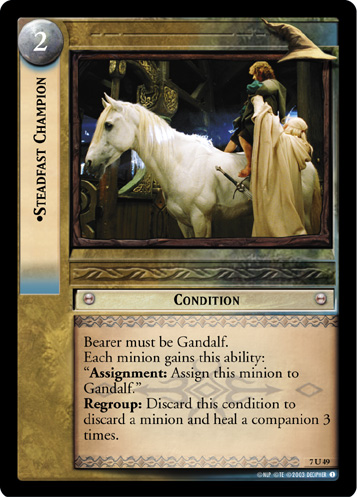
- Aggression (8C1)
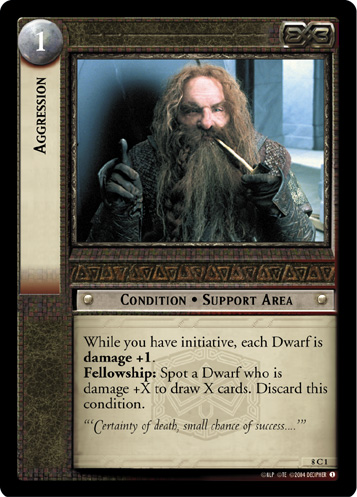
- Memories of Darkness (10U2)
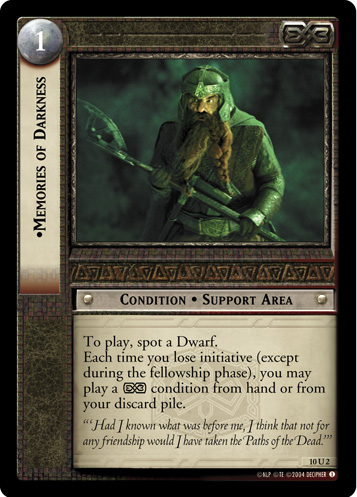
- Galadriel, Lady Redeemed (10R11)
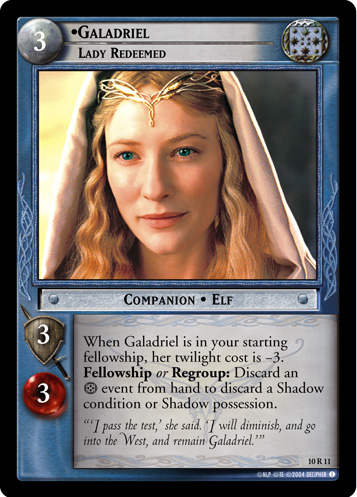 - undercosted with too little cultural enforcement
- undercosted with too little cultural enforcement - Mordor Fiend (10C91)
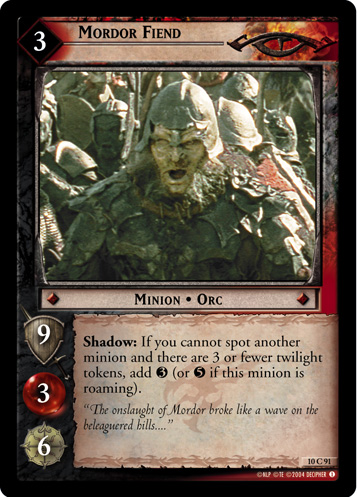
- Final Account (11C31)
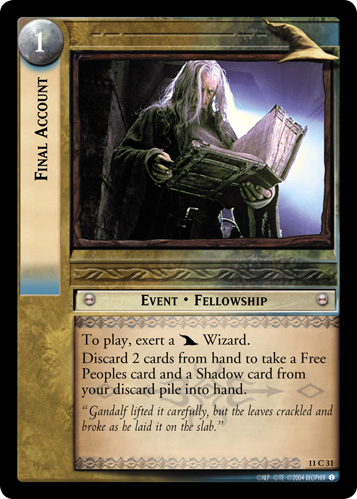 - circumvents the deckbuilding rules that limits cards to 4 copies and does so with no regard for culture or card type
- circumvents the deckbuilding rules that limits cards to 4 copies and does so with no regard for culture or card type - Strange-looking Men (11R100)
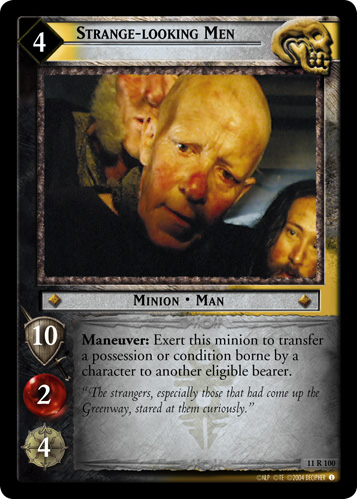 - multi-step loop with Pavise (11C94)
- multi-step loop with Pavise (11C94)
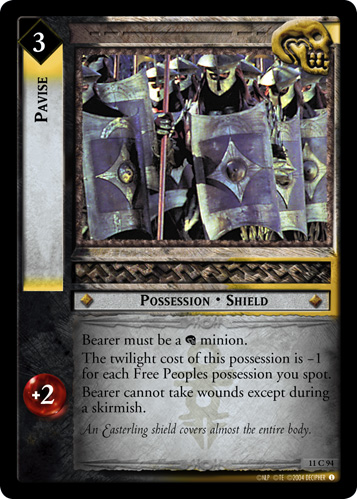 , either Ceremonial Armor (17R41)
, either Ceremonial Armor (17R41)
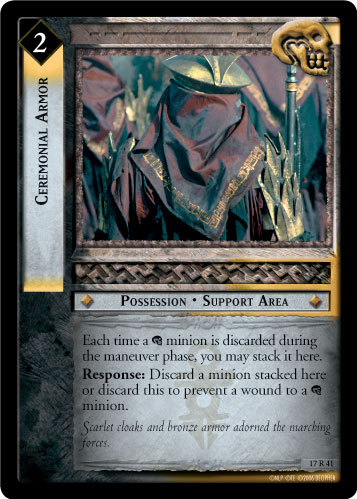 or Wildman's Oath (17C66)
or Wildman's Oath (17C66)
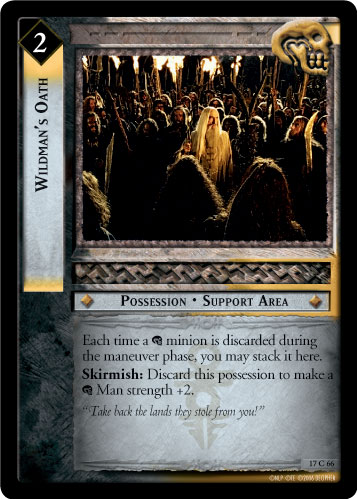 , and certain minions' texts which allows an arbitrary number of
, and certain minions' texts which allows an arbitrary number of Men minions to be played in the maneuver phase
- Demoralized (11U114)
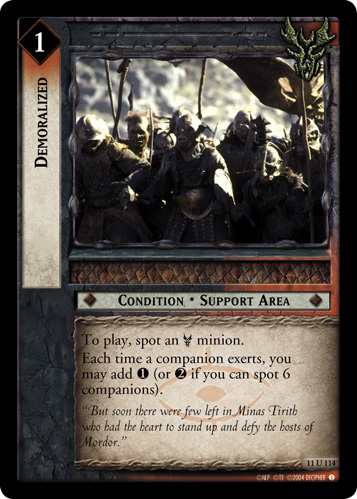 - loop with Rapid Reload (15U89)
- loop with Rapid Reload (15U89)
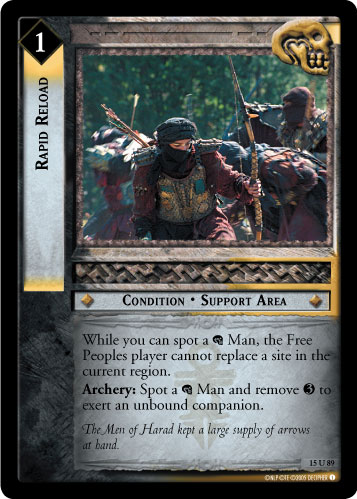
- Orkish Smith (11C132)
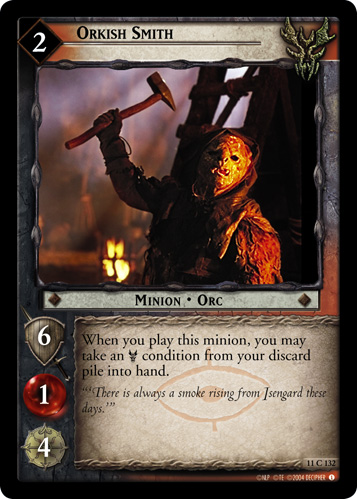 - undercosted and effectively disables the only way for the Free Peoples player to deal with most Shadow conditions (discard them)
- undercosted and effectively disables the only way for the Free Peoples player to deal with most Shadow conditions (discard them) - Courtyard Parapet (13U188)
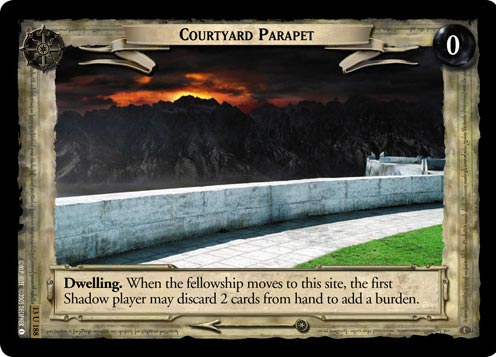 - too easily abused with site manipulation
- too easily abused with site manipulation - Madril, Defender of Osgiliath (15R64)
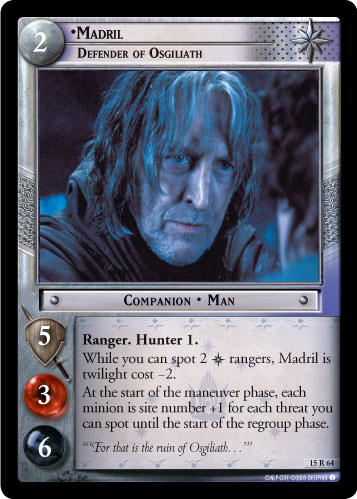 - too powerful in conjunction with Ithilien Blade (15C62)
- too powerful in conjunction with Ithilien Blade (15C62)
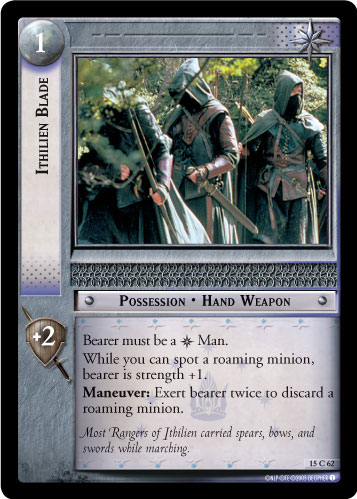
See Also
- mLOTRO's list of supported formats, particularly Hunters Standard (their version of Standard) and their list of Superseded Official Formats
| Formats |
|---|
| Sets | 1 | 2 | 3 | 4 | 5 | 6 | 7 | 8 | 10 | 9 | 11 | 12 | 13 | 14 | 15 | 17 | 18 | 16 | 19 |
|---|---|---|---|---|---|---|---|---|---|---|---|---|---|---|---|---|---|---|---|
| Historical Decipher Formats | Fellowship Block | Towers Block | King Block | War of the Ring Block | Hunters Block | ||||||||||||||
| Towers Standard | |||||||||||||||||||
| King Standard | |||||||||||||||||||
| Movie Block | |||||||||||||||||||
| War of the Ring Standard | |||||||||||||||||||
| Standard | |||||||||||||||||||
| Expanded | |||||||||||||||||||
| Open | |||||||||||||||||||
| Player's Council Formats (including PC Errata) | 1 | 2 | 3 | V1 | 4 | 5 | 6 | 7 | 8 | 9 | 10 | 11 | 12 | 13 | 14 | 15 | 16 | 17 | 18 | 19 |
|---|---|---|---|---|---|---|---|---|---|---|---|---|---|---|---|---|---|---|---|---|
| PC-Fellowship | ||||||||||||||||||||
| PC-Movie | ||||||||||||||||||||
| PC-Expanded | ||||||||||||||||||||
| Unofficial Formats | 1 | 2 | 3 | 4 | 5 | 6 | 7 | 8 | 10 | 9 | 11 | 12 | 13 | 14 | 15 | 17 | 18 | 16 | 19 |
|---|---|---|---|---|---|---|---|---|---|---|---|---|---|---|---|---|---|---|---|
| French | French | ||||||||||||||||||
| Austrian (Movie) | |||||||||||||||||||
| Austrian (Shadows) | |||||||||||||||||||
| Other Variants | |||||
|---|---|---|---|---|---|
| Sealed • Booster Draft • Cube Draft • Culture Shock • Highlander • Poor Man's • PC Errata | |||||